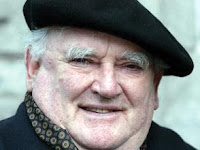 |
| Tim Pat Coogan: Not welcome in my GAA |
The explanations for this tragedy vary widely. The most popular theory is that the attack in Croke Park was purposeful revenge for IRA murders carried out earlier in the day. An Inquiry Commission established at the time to examine events surrounding Bloody Sunday and subsequently released archival documents demonstrate that the official RIC orders were to detain and search the crowd as they filed out of the stadium after the match. According to these reports an accidental tragedy occurred when gunshots from the crowd led to a panicked response by the soldiers. No doubt a questionably neutral 'inquiry' but an account of the events nonetheless. Unfortunately, because of the chosen speaker at Sunday's Commemoration, only one version of the story will be told.
Not Attached to a University for a Reason
Thankfully the commemoration announcement does not refer to Coogan as an 'historian'. Instead he is referred to as an 'historical writer'. Nonetheless, this is a poor decision on behalf of the GAA. Coogan, according to any credible Irish historian is a green, populist, propagandist whose views have no business being endorsed with a speaking engagement of this calibre. He blankets history in varying shades of green while pulling at nationalistic heart-strings and ignoring anything resembling balance.
At times, Coogan uses direct quotes with no reference of any kind as if he is creating dialogue to fit his story. On the vast number of occasions his work does not rely on research supported by archival references. Rather than performing the necessary research Coogan's work uses the word 'probably' with shocking regularity while making sweeping assertions and providing no evidence to support his claims.
In Coogan's book 'Ireland in the Twentieth Century' he dedicates less than a paragraph to the entire incident in Croke Park and not a single footnote. Coogan covers the actual shooting with a single generalised sentence, 'Later that day, the Tans and auxiliaries shot up Croke Park, where Dublin were playing Tipperary in Gaelic football.' He gives no analysis as to why the forces went to Croke Park or what they hoped to accomplish. He uses no eyewitness accounts or military reports. He provides no names of anyone involved - victims, soldiers, or witnesses. Coogan claims, 'Rifle and machine-gun fire killed 14 spectators, and injured hundreds more.' In fact, 12 were cut down by bullets, two were trampled, and the number of injured is wildly exaggerated. Without proper analysis Bloody Sunday is presented as one event in a long list of murderous lunacy carried out by blood-thirsty forces with the support of bigoted politicians.
In the same paragraph, Coogan declares Sean Lemass (the future Taoiseach) was one of the assassins who targeted the British counter-insurgency forces that earlier that morning under instructions from Michael Collins. Subsequent research has proven this claim is absolutely untrue. He also claims the grandfather of Ardal O'Hanlon (Father Dugal of 'Father Ted' fame) was amongst the assassins. As no proper historian would indulge such a digression while writing about targeted murders, no other historical source has substantiated this claim.
History or a Spy Novel
Coogan's version of events reads more like a spy novel with Michael Collins cast as the hero than as a history text. In 'Michael Collins: A Biography' he suggests Collins bordered on clairvoyance with regard to Bloody Sunday. Coogan claims Collins sent a messenger to warn the GAA the match should be called off but the messenger was too late. Again, no footnote or reference is provided in support of this claim.
Additionally, his writing is generally of poor quality, and his assertions bring nothing credible to the table. His use of the term 'British' at times is questionable. Coogan's writing can be unclear whether he means the British government, the British military leadership, or every man, woman, and child within in the United Kingdom.
His simplistic perspective is of an angelic uniformly supported IRA fighting the good fight against the evil Catholic-hating forces of the Crown. Coogan is widely known as a blind supporter of Michael Collins and overly critical of Eamon de Valera. De Valera is painted in wide strokes as too cautious while Collins is a man of action.
While there is certainly a market for the antagonistic rants of Tim Pat Coogan, the GAA has made an error in judgement. By inviting Coogan to speak, the GAA is endorsing Coogan's version of history. This is a history which discourages reconciliation and glorifies the IRA (both past and present).
A far more appropriate choice for this engagement would be Professor Michael Laffan - the recently retired member of UCD School of History and Archives, whose expertise in this period of history is the result of a lifetime of research and reflection.
Out of Step with the Modern GAA
The GAA should try to position itself as an institution which heals divisions by bringing communities together through sport. The GAA has taken commendable strides forward by allowing 'British' sports to be held on its most sacred pitch - boldly choosing to move beyond the tired divisions of the past to a hopeful future. Inviting Coogan is a slap in the face of this progressive posture.
The GAA represents all constituent members and volunteers. Many communities find esteem and identity in their local clubs. My GAA is one of teamwork, respect and peace. Coogan's Ireland is one of bitterness, half-truths and division. In the future, the GAA should choose the version of Ireland experienced by the vast majority of its members and not give credence nor a platform to Coogan.


I must say, your exposition and critique regarding T. P. Coogan and his 'interpretation' of Irish history - in this case the events of Bloody Sunday - was excellent; and is a point I would agree on. Please continue to produce such fine analysis.
ReplyDeleteThis Coogan guy is an arse, its like reading a child's work.
ReplyDelete